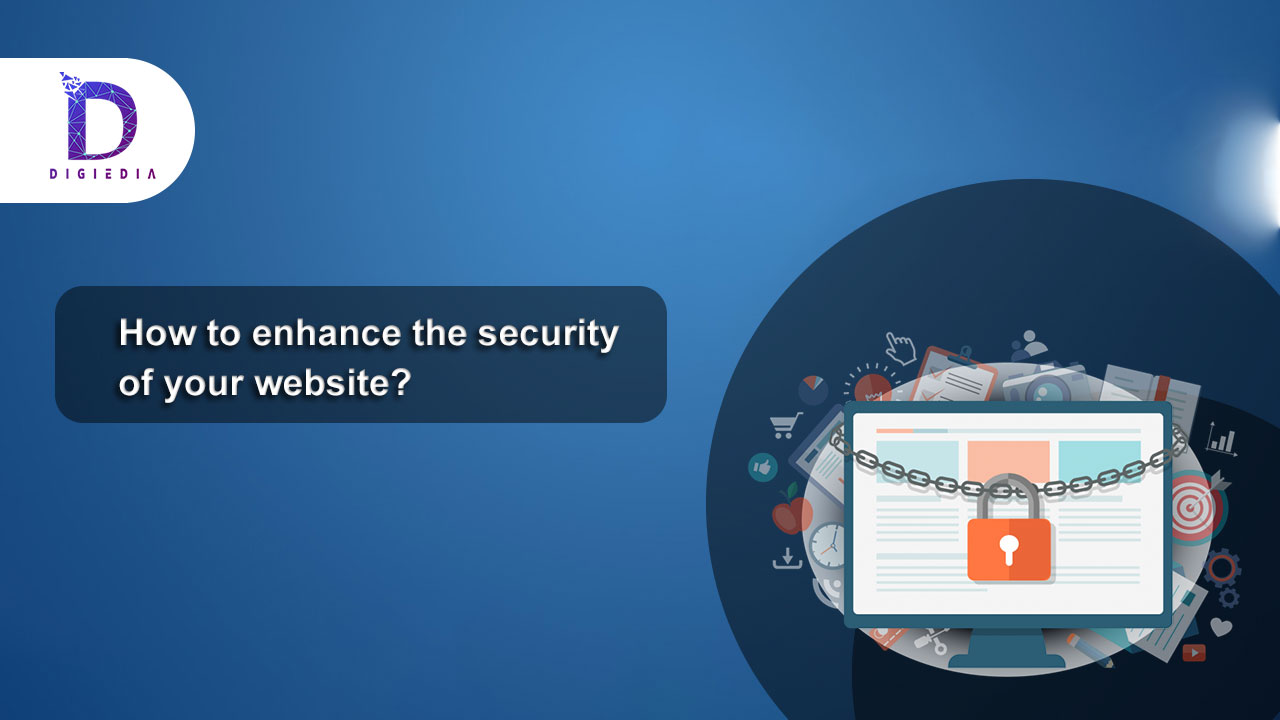
How to enhance the security of your website?
- DIGIEDIA
- Blogs
- 02 May 2022
- No Comments
The ease with which websites can be created has increased in recent years. Business owners are now webmasters thanks to content management systems (CMS) like WordPress and Joomla. The duty for website security has now been placed in your hands, however many website owners are unaware of how to make their sites secure. Customers need to know that their data is secure when they utilize an online credit card payment processor. Visitors are concerned about their personal information falling into the wrong hands. Users demand a secure online experience regardless of whether you own a small business or a large corporation. Let’s see how you can enhance the security of your website.
Ensure that your software and plugins are up to date
Every day, a large number of websites are harmed as a result of obsolete software. Sites are being scanned for potential hackers and bots to attack.
Your website’s health and security depend on regular updates. Your site is not secure if it’s software or applications are out of date.
Take all requests for software and plugin updates very seriously.
Security enhancements and vulnerability fixes are frequently included in updates. Check for updates on your website or install an update notification plugin. Automatic updates are another solution for ensuring website security on some platforms.
Your site will become less secure the longer you wait. Make it a top priority to keep your website and its components up to date.
Select a Secure Password
It’s difficult to keep track of all the websites, databases, and apps that require passwords. To remember their login information, a lot of people use the same password everywhere. However, this is a serious security blunder.
For each, each log-in request, create a new password. Create passwords that are complex, unpredictable, and tough to guess. Then save them somewhere other than the website directory.
As an example, you could create a password using a 14-digit combination of letters and digits. The password(s) could then be saved in an offline file, on a smartphone, or a different computer.
Your CMS will ask for a login, and you’ll need to create a strong password.
Keep track of who has access to what and who has administrative privileges
Initially, you may feel comfortable granting access to your website to a few high-level employees. You give them administrative rights in the hopes that they will take good care of their sites. This is the ideal scenario, but it isn’t always the case.
Employees, unfortunately, do not consider website security when logging into the CMS. Instead, they’re focused on the job at hand.
If they make a mistake or overlook an issue, it could lead to a serious security problem.
It’s critical to thoroughly evaluate your staff before granting them access to your website. Check to see whether they’ve used your CMS before and if they know what to look for to avoid a security breach.
Make a record and update it frequently to keep track of who has access to your CMS and their administrative settings.
Employees are hired and fired regularly. Keeping a tangible record of who does what with your website is one of the greatest strategies to avoid security risks.
When it comes to user access, be cautious.
Make a backup of your website
Having a robust backup solution is one of the greatest ways to keep your site safe. It’s a good idea to have a few. Each is essential for restoring your website after a significant security breach. It is required to enhance the security of your website.
You can utilize a variety of techniques to restore files that have been corrupted or lost.
Keep the information from your website off-site. Backups should not be stored on the same server as your website; they are just as vulnerable to hacking.
Keep a backup of your website on a personal computer or hard drive. Find a secure, off-site location to store your data and keep it safe from hardware failures, hacking, and viruses.
Another approach is to make a cloud backup of your website.
You should consider automating your website backups in addition to deciding where to store them. Make use of a system that allows you to plan your site backups. You should also make sure that your solution has a solid recovery system.
Make your backup process redundant by backing up your backup.
This allows you to recover files from any point before the breach or virus.
Fill out an application for a Web Application Firewall
Make that you apply a web application firewall (WAF). It establishes a link between your website server and your data connection. To defend your site, the goal is to read every bit of data that comes through it.
Most WAFs today are cloud-based and plug-and-play services. The cloud service acts as a filter for all incoming traffic, preventing any hacking efforts. Other sorts of undesirable traffic, such as spammers and harmful bots, are also blocked.
Enhance network security
When you think your website is safe, you should check the security of your network.
Employees who utilize office laptops may unintentionally create a dangerous route to your website.
Consider the following at your company to prevent them from gaining access to your website’s server:
Allow computer logins to expire after a certain amount of time.
Make sure your system notifies users of password changes every three months.
Ensure that every time a device is connected to the network, it is inspected for malware.
Conclusion
Above were the steps to enhance the security of your website. You can’t just build up a website and forget about it as a business owner or webmaster. Even though it is now easier than ever to create a website, security maintenance is still required.
When it comes to securing your company’s and customers’ data, always be proactive. Whether your site accepts online payments or collects personal information, the information users provide must end up in the correct hands.
